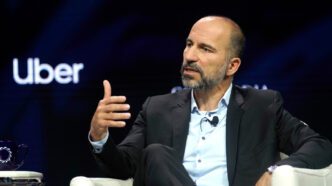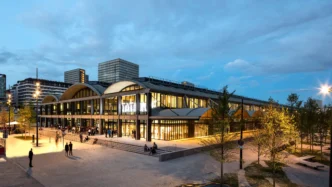Uber is expanding its footprint in India by stepping into the country’s fast-growing B2B logistics space, marking a major strategic move beyond its core ride-hailing business. The company announced it will soon begin offering on-demand logistics services through the government-backed Open Network for Digital Commerce (ONDC), a nonprofit platform designed to disrupt the dominance of Amazon and Flipkart and democratize digital commerce across India.
While Uber hasn’t disclosed a launch timeline, the service will initially focus on food deliveries for ONDC-participating businesses, with plans to later expand into e-commerce, grocery, pharmacy, and healthcare logistics. The offering will leverage Uber’s vast network of 1.4 million drivers across India, positioning the company to compete with major B2B logistics players like Shiprocket, Shadowfax, Porter, and Loadshare.
This new logistics offering will function as a white-label solution, similar to Uber Direct in the U.S., but limited to ONDC-enabled sellers and service providers. A person familiar with the plans noted it will not be available to the general public or to businesses outside ONDC’s open network.
Capitalizing on India’s Booming Logistics Sector
Uber’s foray into B2B logistics comes amid a broader push into delivery services. Earlier this month, it launched Courier XL in Delhi NCR and Mumbai, a consumer logistics service enabling customers to send large packages via three- or four-wheeler carriers. This builds on its existing two-wheeler Courier service, aimed at smaller deliveries.
The expansion into logistics is well-timed. According to projections from Motilal Oswal, India’s logistics sector is set to grow by 49%, reaching ₹13.4 trillion ($157 billion) by FY28, up from ₹9 trillion ($105 billion) in FY23. For Uber, this represents a substantial growth opportunity as it diversifies beyond ride-hailing in a highly competitive market.
The company’s operating revenue in India surged 41.1% year-over-year in 2023 to $439 million, with collections from rides alone rising by 21.45% to $94.27 million. Expanding into logistics could further solidify its position in one of its most important international markets.
Facing Competition and Boosting ONDC Integration
Uber’s move into B2B logistics also comes as it faces growing pressure from homegrown ride-hailing startups like Rapido and Namma Yatri, the latter backed by investors including Google and Blume Ventures. Diversifying into logistics allows Uber to explore new revenue streams while maintaining relevance amid stiff local competition.
At the same time, the partnership gives a boost to ONDC, which has struggled to scale despite its ambition to replicate the success of India’s Unified Payments Interface (UPI) in digital commerce. ONDC saw a 34% drop in retail orders from 6.5 million in October to 4.3 million in April, and recent leadership churn has raised concerns about the platform’s momentum.
Uber has already made initial inroads with ONDC through a metro ticketing integration, beginning with Delhi Metro tickets in its app and expanding to three more cities later this year. This service stems from a February 2024 MoU signed during Uber CEO Dara Khosrowshahi’s visit to India.
Vibhor Jain, ONDC’s Acting CEO and COO, said the collaboration with Uber will “unlock new possibilities — from seamless multimodal journeys to unifying a fragmented logistics ecosystem.” He emphasized that this partnership not only enhances service for ONDC users but also lays the groundwork for future innovation across India’s mobility and services infrastructure.
As Uber gears up to offer white-label logistics through ONDC, its entry marks more than just a business expansion—it represents a broader bet on India’s open digital economy, offering both a commercial opportunity and a strategic play in one of the world’s most dynamic markets.













